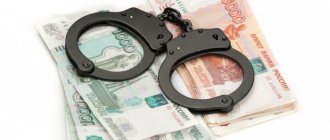5.What consequences can there be in the case of illegal trade in alcohol and tobacco products?
Illegal trade in alcohol
When plotting illegal actions, many defendants think that they will not face criminal sentences. At least they certainly won't get caught. But, as practice shows, law enforcement agencies are not asleep. And the media is replete with criminal cases from different regions of our country.
Thus, in one of the cases, members of an organized group planned to purchase illegal alcoholic beverages, covered with obviously counterfeit federal special stamps, or without them, on the territory of the Russian Federation, at reduced prices, with delivery of the purchased alcoholic beverages to garages. The result of illegal trade was a very real criminal sentence under paragraph “a” of Part 6 of Art. 171.1 of the Criminal Code of the Russian Federation and paragraph “a”, part 2 of Art. 171.3 of the Criminal Code of the Russian Federation (Sentence of the Sharypovsky City Court (Krasnoyarsk Territory) dated September 17, 2020 No. 1-121/2019 1-3/2020).
At the end of January 2022, police discovered 8 tons of unlabeled alcohol in Stary Oskol. The 50-year-old suspect rented premises and stored about 8 tons of alcohol in them, poured into cans and bottles. According to preliminary data, the man sold the products at retail and in small wholesale quantities through friends. A criminal case has been initiated under Part 5 of Art. 171.1 of the Criminal Code of the Russian Federation. The perpetrator faces up to 3 years in prison.
And in March 2022, Volgograd police officers detained suspects in the possession, acquisition, transportation and sale of alcoholic beverages without labeling. Income from illegal activities amounted to almost 14 million rubles. Operatives conducted searches in the company's office, retail outlets and 2 rented warehouse premises. Over 52,000 liters of brewing products were seized without labeling and information about the manufacturer, composition and other characteristics of the product. A criminal case has been initiated under Part 4 of Art. 171.1 of the Criminal Code of the Russian Federation. A preventive measure was chosen for the attackers in the form of a ban on certain actions.
Illicit trade in tobacco products
The sale of unmarked cigarettes is also an object of making illegal profit. Not long ago, in the Moscow region, more than 1 million packs of unmarked tobacco products were seized from illicit trafficking and members of an organized group who were selling them were detained. During searches, computers, telephones, seals and stamps, as well as over a million packs of well-known brands of cigarettes with a total value of over 180 million rubles were confiscated from suspects and warehouses in Moscow and the Moscow region. A criminal case has been initiated under paragraph 6 of Article 171.1. Criminal Code of the Russian Federation. The sanction of the article provides for a penalty of six years in prison.
Key Concepts
For a better understanding of the mechanism of how counterfeit is pursued by the Criminal Code of the Russian Federation, it is advisable to start with basic concepts:
- Excise duty is a type of tax levy levied on monopoly goods with a high degree of profitability.
- Excise stamps are used to mark products subject to excise duty.
- Special stamps indicate the legal origin of the product.
- The mark of conformity is another type of marking that confirms that the purchased product meets the required standards.
The production and use of counterfeit brands and signs is punishable by criminal law. Goods sold in Duty free stores are exempt from paying excise duty.
The disposition of the legal norm under consideration does not name specific signs of an atrocity, but refers to other normative legal acts to establish them.
The Code of Administrative Offenses provides for punishment for the same acts under Art. 15.12 Code of Administrative Offences. The difference between an administrative offense and a criminal offense lies in the amount of damage caused.
The subject of the offense is the entire assortment, which is subject to mandatory labeling. This also includes alcohol and tobacco products, jewelry, precious stones, some types of raw materials and more. The presence of an excise stamp on the packaging gives the buyer a guarantee of the legality of its origin. In our country, excise taxes are imposed only on a certain group of goods - alcohol with an ethyl alcohol content of over 9%, tobacco. In addition, imports imported from the CIS countries are marked with a conformity mark, which means that the products meet the required quality standards.
The objective side of the offense has several forms of expression. For example, the production of counterfeit goods, its acquisition, sale or distribution, as well as transportation.
Often difficulties with the qualification of a crime arise when determining the subjective side, when proving intent. At the same time, the intent must consist of the person’s desire to sell prohibited products. If intent is not proven, the actions of the accused will be classified as illegal business.
The subject is an individual or a group of individuals who have organized a sales line for counterfeit products. For committing a crime provided for by the rule of law in question, there is a rather severe punishment.
In the current version, the legislator has provided for the following types of criminal liability:
- fine;
- a fine in the amount of wages or other income for a certain period;
- imprisonment for up to 6 years;
- forced labor.
In addition, the court may impose a combined sentence. The size of the fine, the term of imprisonment and the amount of forced labor vary depending on the qualification of the criminal act. The legislator identifies the commission of this offense by an organized group, as well as on a particularly large scale, as qualifying circumstances.
The main problem with the application of the legal norm in question is the lack of consensus regarding the object of the crime. Most often, an object is understood directly as the process of manufacturing and circulation of products, which are marked in the prescribed manner in the course of business activities.
6.What does the coming day have in store for us?
At the time of recording the video, draft Federal Law No. 972623-7 was adopted by the State Duma in the first reading (02/10/2021).
It changes the punishment for violating the rules of labeling of medicines and other goods.
Now the production and sale of drugs with or without labeling violations will cost an official a fine of 5 thousand to 10 thousand rubles, and a company - from 50 thousand to 100 thousand rubles. The unmarked goods themselves will be confiscated.
A similar penalty (not currently available) is planned to be introduced for the putting into circulation, as well as the purchase, sale or other transfer that is not related to the putting into circulation of unlabeled goods (except for medicines).
In case of repeated violation, the fine is doubled :
- for company officials - from 10 thousand to 20 thousand rubles;
- for companies - from 100 thousand to 500 thousand rubles or business suspension for up to 90 days.
Unmarked items will also be confiscated.
The bill proposes to introduce liability for repeated commission of actions in the form of confiscation of the instrument of the crime - production equipment that was used to manufacture unmarked goods subject to mandatory labeling.
Business - tobacco
Another type of product that is punishable for selling without labeling in Russia is cigarettes and other tobacco products. One of the latest such cases is an investigation in Kabardino-Balkaria, where more than a million packs of cigarettes without excise stamps were found in one of the warehouses in Nalchik.
This summer, in the capital's Zyuzino district, police discovered a warehouse of cigarettes without excise stamps. The entrepreneur, whom the Ministry of Internal Affairs reports call a “native of the Middle East,” first bought 11 tons of cigarettes, sold them and purchased another 27 tons, after which he was detained.
Criminal liability
The Criminal Code contains two articles concerning illegal trafficking in alcohol. The first of them is Article 171.3. In accordance with it, the following actions in relation to alcoholic products carried out without the necessary license are subject to punishment:
- Manufacturing;
- Procurement (including import);
- Storage;
- Supply (including export);
- Move;
- Retail.
For the objective side of this crime, it is also necessary that the cost of alcoholic beverages exceeds 100 thousand rubles. If the size of the products sold or produced is smaller, then liability arises under administrative law.
Article 171.4 provides for liability for retail sale of alcoholic products committed by a person who already has an administrative penalty for a similar act, that is, less than 1 year has passed since the decision was made to impose an administrative penalty on him.
The statutory fine for selling alcohol to minors is:
- for individuals - from thirty to fifty thousand rubles;
- for officials - from one hundred to two hundred thousand;
- for organizations - from three hundred to five hundred thousand.
In addition, repeated violations may result in criminal liability.
You can read more in the article here.
Under Article 171.4, the following may be prosecuted for the illegal sale of alcoholic beverages:
- Individuals selling alcohol (including their own production);
- Entrepreneurs selling alcohol without forming a legal entity and without a license in cases where one is necessary.
Administrative responsibility
The Code of Administrative Offenses contains several articles related to illegal activities in relation to alcoholic products.
Did you know
Drinking alcoholic beverages in public places is considered an administrative offense and faces a fine of 500 to 1,500 rubles.
So part 2 of article 14.16 of the Code of Administrative Offenses for the circulation of alcoholic products (except for retail trade) without the appropriate documents, which, according to the law, can confirm the legality of the production of these products. The sanction of the article for these violations provides for a fine:
- For officials – from 10 to 15 thousand rubles;
- For organizations – from 200 to 300 thousand.
Additionally, punishment is applied in the form of special confiscation - all alcoholic products without the appropriate documents are confiscated.
Article 14.17 of the Code of Administrative Offenses provides for liability for legal entities for the illegal circulation of alcohol, as well as its production without a license. The fine that the organization may face is from 200 to 300 thousand rubles with confiscation of alcoholic products and raw materials.
Under Article 14.18, persons who use ethyl alcohol produced from non-food raw materials to produce alcoholic beverages can be punished. The sanction is the same as under Part 2 of Article 14.16.
Responsibility for moonshine
Despite the severity of measures taken by the state to combat low-quality alcoholic products, brewing moonshine for personal use is not limited by law.
Note! A bottle of moonshine, brewed at home, but exclusively for one’s own consumption, cannot become the basis for bringing a person to criminal or administrative liability.
But if such a product is sold, the “moonshiners” will have to answer for one of the articles discussed above, depending on the situation, as well as for illegal business activities.
Selfish interest
Since October 1, 2016, sellers of natural fur coats will face criminal liability for the sale of unmarked goods. Electronic chips for fur coats were introduced in the summer, but Rospotrebnadzor and the Tax Service gave entrepreneurs these few months to have time to attach a plastic beacon label to each fur coat: green for those made in Russia, red for those imported from abroad. Using a QR code, any buyer can find out what kind of fur a fur coat is actually made from and where it was imported from.
There have been no reports of criminal cases against sellers or manufacturers of fur coats yet, but Rospotrebnadzor has been reporting seizures of fur products since mid-October. Department employees carried out raids on large shopping malls, Novocherkizovsky, Konkovo, and seized approximately 300 fur coats with a total value of 7 million rubles. In Murmansk, Rospotrebnadzor paralyzed the work of three stores, seizing fur products worth 24 million rubles. In Kaliningrad, 27 not the most expensive fur coats were under arrest: for a total amount of less than 700 thousand rubles.
Market analysts write that entrepreneurs are rapidly getting rid of “gray” (that is, imported or produced illegally) fur coats. The Russian Union of Entrepreneurs of Textile and Light Industry estimated that in the first three months of the labeling law, fur coats worth 10 billion rubles were sold - the same as in the entire 2015. At the same time, prices for fur goods fell by two to two and a half times.


